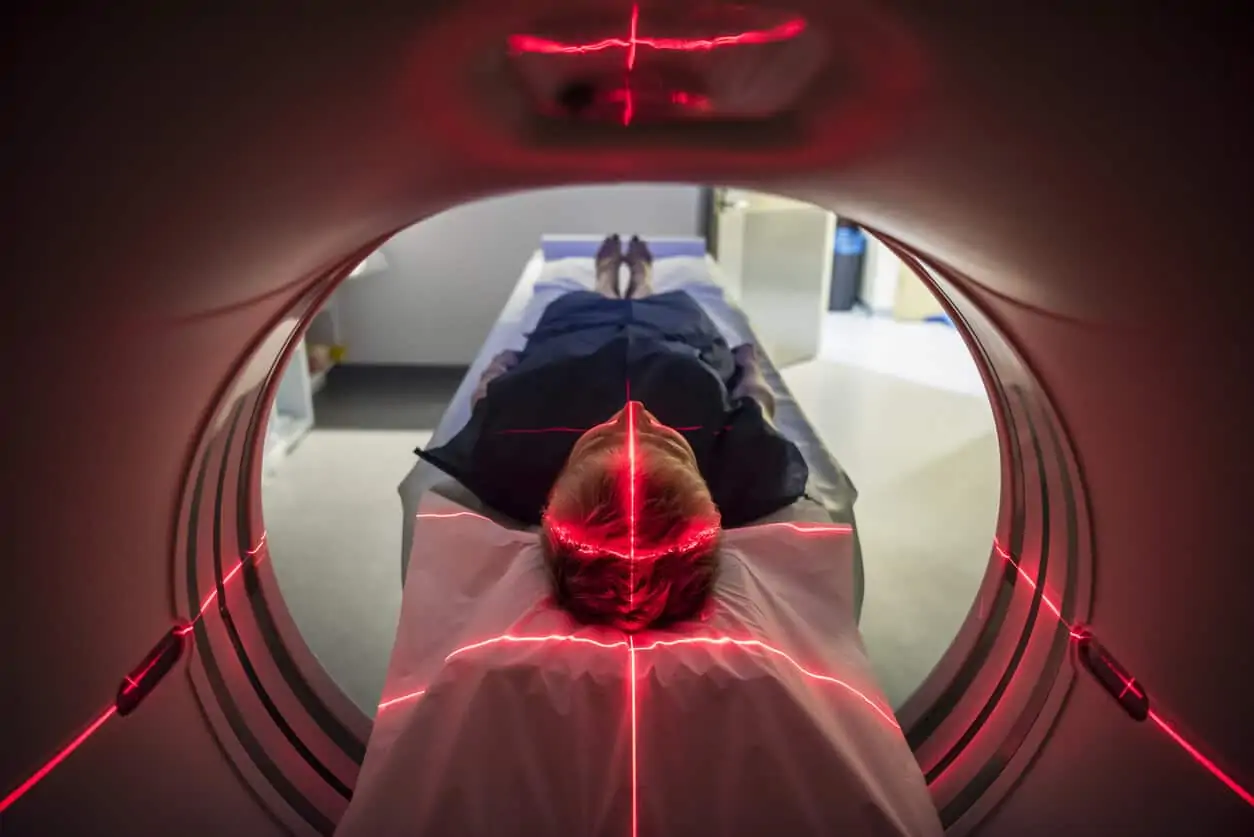
What is the difference between an MRI scan and a CT scan?
CT (computerized tomography) scans to create a 3D image of the patient’s organ(s) by photographing a collection of different x-ray images from various angles.
MRI (magnetic resonance imaging) scans to create one of the most detailed images possible with the combined use of powerful magnets and radiofrequency impulses. They are often used when other methods fall short because they produce a high-resolution, in-depth photograph. One of the tradeoffs for producing such an image is the safety concerns due to EMF (electromagnetic frequency) risk levels.
Differences between an MRI scan and a CT scan:
MRI scan |
CT scan |
| Uses a combination of magnetic fields and radiofrequency impulses | Uses x-rays (ionized radiation) |
| More detailed images of inner organs (soft tissues, skeletal system, brain, et.c) | Less detailed images of the body than MRI, but more detailed than traditional x-rays |
| More expensive | Less expensive |
| Enclosed space (claustrophobia trigger) | Less enclosed space (shorter than MRI) |
| EMF concerns (from magnets and radio waves) | Radiation concerns (from x-rays) |
| Can be time intensive (15-90 minutes) | Can be fast (5-30 minutes) |
| Noisy | Less noisy than MRI |
| Captures tendons and ligaments as well as other hard-to-see space between fat, water, etc. | Does not show tendons and ligaments |
What can CT scans detect?
CT scans are often used to quickly detect and rule out trauma effects, such as fractures or breaks from falling or impact accidents.
CT can detect:
- Abnormal tissue
- Blood clots
- Bone breaks/fractures (including more subtle ones that x-rays might not see)
- Cancer (preferred scan for detection)
- Organ injuries
- Pneumonia
- Tumors (depending on size)
What is an MRI scan used to diagnose?
An MRI can be used to diagnose harder-to-see soft tissue issues that a CT scan or X-ray might miss.
MRIs are commonly used to detect:
- Herniated disks
- Soft tissue damage
- Tendon or ligament tears
- Tumors
Why would you need to have an MRI after having a CT scan?
Though CAT scans give a more detailed scan than an x-ray, an MRI provides the highest resolution scan of the three. As stated above, MRIs can capture more hard-to-catch details, such as tendon and ligament tears, but with an added health risk.
A doctor might start with a CT scan order. If the CT scan does not reveal what they’re looking for (e.g. tumor), a doctor might order an MRI to make sure they haven’t missed anything.
Which is safer: CT scan or MRI?
While CT scans run the risk of radiation due to the x-rays, the added clarity of strong magnets and radio waves makes MRIs more dangerous. MRIs also use a tightly enclosed, noisy space that can take more time than CT scans. They can cause more anxiety and stress in claustrophobic people since the CT scan uses a shorter, more open bed.
MRI scan risks:
- Loud noises from the timed magnetic lock changes may damage ears without proper protection. Some of the rare but possible side effects are tinnitus (ringing in ears) or hearing loss.
- Implant wearers (cochlear devices, pacemakers, stents, etc.) should consult their doctor before MRI scans, as they present heightened risks such as malfunction.
- Magnetic objects can be projected due to the strong magnetic field that’s used, so take extra care to ensure no magnetic objects enter the space prior to the scan.
- Radiofrequency energy can cause body heating, which increases as the procedure time increases.
- Twitching sensation due to nerve stimulation may occur.
CT scan risks:
- Allergic reaction to contrast material (iodine)
- Pregnancy defects may occur due to radiation
- Cancer risks due to ionizing radiation
Which is better: a CT scan or MRI?
Each scan is better or worse depending on the specific needs and health of the patient. A CT scan is better for bone breaks and fractures while MRI is better for soft tissue contrast images that require higher detail for detection. An MRI is seen as more risk-prone due to the magnetic resonance and radio waves. However, a CT scan has its own health risks due to ionized radiation. Claustrophobia adds another layer to the risk levels, as does medical devices or health history. The best practice is to consult your physician to discuss which option is best for you.
Questions? Call AmeriPlan
If you are stressed about paying for your family’s medical bills or prescription drug costs, contact AmeriPlan. Fill out this contact form or call 800-647-8421 for more information.
